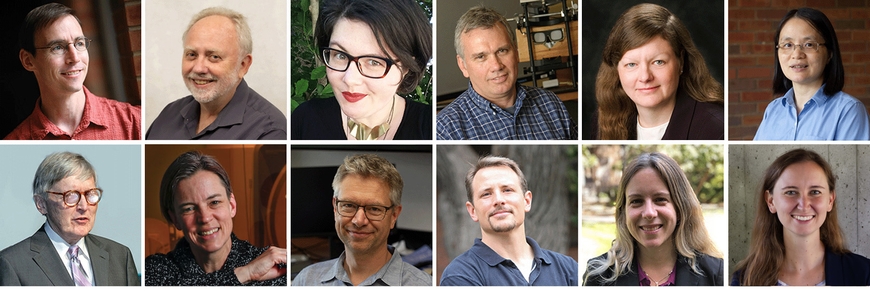Cognitive and Brain Sciences (CAB)

Bottom row: Gordon Legge, Cheryl Olman, Andrew Oxenham, Paul Schrater, Iris Vilares, Amanda Woodward
The Cognitive and Brain Sciences (CAB) program trains the next generation of scientists to advance our understanding of cognitive and perceptual behavior and its underlying neural bases. Our training program is committed to developing student knowledge and skills that span disciplines. Research in the CAB program is organized around two main areas:
- Cognition: affective neuroscience, learning, memory, and decision making
- Perception: computational, neural, and behavioral aspects of vision and hearing, including sensory loss
CAB faculty are highly collaborative, offering opportunities to work across labs within psychology. Our faculty work closely with other labs within psychology as well as other departments, including clinical psychology, behavior genetics, child development, computer science, neuroscience, educational psychology, neurology, communication disorders, the Center for Cognitive Sciences (CCS), the Center for Applied and Translational Sensory Science (CATSS), and the Center for Magnetic Resonance Research (CMRR).
Our program encourages applicants with a background in relevant areas of psychology (e.g., perception, cognition, learning, behavioral neuroscience) as well those who have backgrounds in related fields such as biology, neuroscience, computer science, statistics, engineering, and mathematics.
Curriculum
Students take courses and seminars that cover a variety of topics related to Cognitive and Brain Sciences, both within Psychology and in other departments, such as Statistics, Computer Science and Engineering, and Neuroscience. Visit the Graduate Education Catalog: Psychology for curriculum requirements specific to the CAB program.
Research
Students are involved in intensive research throughout their graduate training, beginning with a first-year research project and culminating in a dissertation that will usually reflect the body of work carried out throughout their graduate training. The CAB area has numerous labs that use a wide range of methods aimed at advancing our knowledge of the neural and psychological mechanisms underlying human behavior.
Experimental methods include behavioral measures, computational modeling, pharmacology, genetics, neural recording, electroencephalography (EEG), and functional magnetic resonance imaging (fMRI). Topics include perception, learning and memory, attention, decision making, creativity, affect, and motivation. Discoveries from CAB are applied widely in areas such as drug addiction, artificial intelligence, human factors engineering, and clinical hearing and vision loss.
Funding Opportunities
What funding do students receive? Please refer to the Department of Psychology Funding Opportunities webpage.
Core Faculty and Research Areas
Cognition (learning, memory, and decision-making)
Charles Randy Fletcher (Associate Professor) - text comprehension, memory for text
Nicola Grissom (Associate Professor) - decision-making, sex differences, neurodevelopmental disorders
Wilma Koutstaal (Professor) - flexible thinking, memory, creativity
Vanessa Lee (Professor) - attention, implicit learning, medical image perception
Paul Schrater (Associate Professor) - artificial intelligence, computational neuroscience, cognitive science
Iris Vilares (Assistant Professor) - decision-making, neuroeconomics, computational psychiatry
Amanda Woodward (Assistant Teaching Professor) - early social cognition, social exlucsion, social evaluations, face processing, scholarship of teaching and learning
Perception (vision and hearing)
Stephen Engel (Professor) - visual perception, brain plasticity, neuroimaging
Gordon Legge (Distinguished McKnight University Professor) - visual perception, visual impairment, applications of vision science
Daniel J. Kersten (Professor) - vision, computational neuroscience, neuroimaging
Cheryl Olman (Professor and Area Director) - fMRI, computational neuroscience, vision
Andrew J. Oxenham (Distinguished McKnight University Professor) - auditory perception, hearing loss, neuroimaging
*CAB anticipates welcoming new faculty member Kurt Fraser in August 2024.
Affiliated Faculty
Geoffrey Ghose, Neuroscience
Andrew Harris, Medicine
Benjamin Hayden, Neuroscience
Kendrick Kay, Radiology
Panayiota (Pani) Kendeou, Educational Psychology
Kimberly Kirkpatrick, Office of Vice President for Research
Eric Larsson, LIFE-Midwest: The Lovaas Institute for Early Intervention
Anna Lee, Pharmacology
Mark LeSage, Medicine
Monica Luciana, Distinguished McKnight University Professor
Angus MacDonald, Professor
A. David Redish, Neuroscience
Roger Remington, Psychology
Jocelyn Richard, Neuroscience
Emeritus Faculty
Dwight Burkhardt, Professor Emeritus
Jonathan Gewirtz, Professor Emeritus
J. Bruce Overmier, Professor Emeritus
Gail Peterson, Associate Professor Emeritus